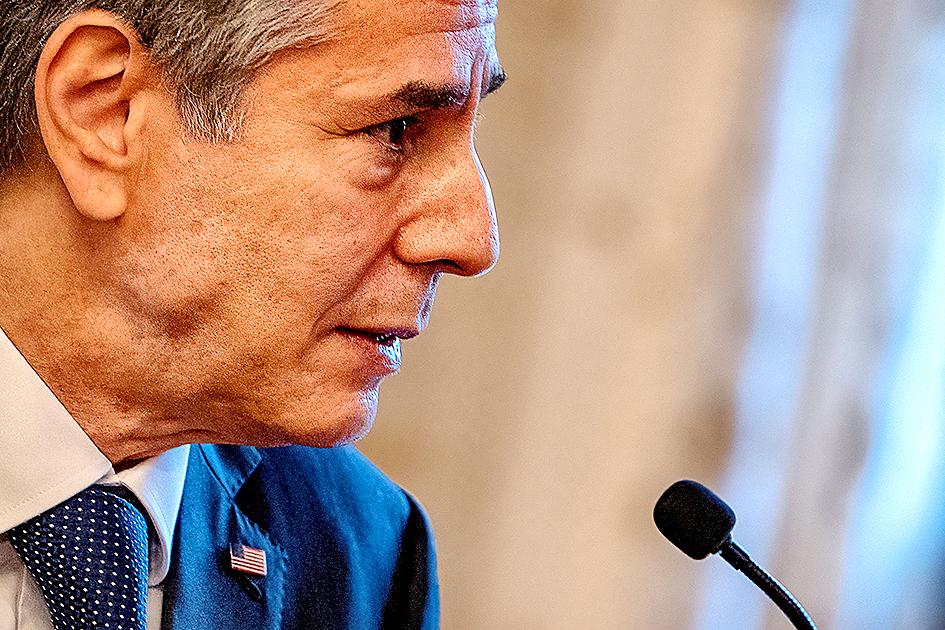The US on Friday condemned China for cutting off bilateral cooperation in a number of key areas and said Beijing could ease tensions over Taiwan by ending its “provocative” live-fire military drills.
US National Security Council spokesman John Kirby said that China’s decision to halt engagement on climate change and other issues was “fundamentally irresponsible.”
“They think they’re punishing us by shutting down this channel,” Kirby told reporters.

Photo: Reuters
“They’re actually punishing the whole world because the climate crisis doesn’t recognize geographic boundaries and borders,” he said. “It’s truly a global and existential crisis.”
“The world’s largest emitter now is refusing to engage on critical steps necessary to combat the climate crisis, which actually impacts our partners from rising sea levels in the Pacific Islands and fires across Europe,” Kirby added.
“We should not hold hostage cooperation on matters of global concern because of differences between our two countries,” US Secretary of State Antony Blinken told a news conference during a visit to Manila.
China earlier said it was ending cooperation with the US on a litany of key issues including climate change, efforts to counter drug trafficking and military talks, as relations between the two countries nosedived over Taiwan.
Beijing has reacted furiously to a visit by US House of Representatives Speaker Nancy Pelosi to Taiwan.
Since Thursday, China has conducted a series of huge military drills around Taiwan proper, which have been roundly condemned by the US and other countries.
Kirby said China can “go a long way to taking the tensions down by simply stopping these provocative military exercises and ending the rhetoric.”
Singaporean Minister of Foreign Affairs Vivian Balakrishnan told local media following an ASEAN foreign ministers’ meeting on Friday that he has spoken to Chinese Minister of Foreign Affairs Wang Yi (王毅) about the issue.
Balakrishnan told Wang that the “main danger is you have got a lot of ships and planes and missiles massed around there. There is a danger, even though I know you do not want to go to war, but there is a danger of accidents and miscalculations,” a transcript released yesterday by the Singaporean Ministry of Foreign Affairs showed.
“For what it is worth, we repeat the appeal that for the rest of us in Southeast Asia, we actually want temperatures to come down. It is actually very important for Southeast Asia, for China and the United States to get along,” he said.
“Once you split [the US-China relations] apart, it means higher prices, it means less efficient supply chains. It means a more divided world, a more disrupted and dangerous world. Those are the stakes,” he said.
Additional reporting by staff writer

US President Donald Trump yesterday announced sweeping "reciprocal tariffs" on US trading partners, including a 32 percent tax on goods from Taiwan that is set to take effect on Wednesday. At a Rose Garden event, Trump declared a 10 percent baseline tax on imports from all countries, with the White House saying it would take effect on Saturday. Countries with larger trade surpluses with the US would face higher duties beginning on Wednesday, including Taiwan (32 percent), China (34 percent), Japan (24 percent), South Korea (25 percent), Vietnam (46 percent) and Thailand (36 percent). Canada and Mexico, the two largest US trading

ACTION PLAN: Taiwan would expand procurement from the US and encourage more companies to invest in the US to deepen bilateral cooperation, Lai said The government would not impose reciprocal tariffs in retaliation against US levies, President William Lai (賴清德) said yesterday, as he announced five strategies to address the issue, including pledging to increase Taiwanese companies’ investments in the US. Lai has in the past few days met with administrative and national security officials, as well as representatives from various industries, to explore countermeasures after US President Donald Trump on Wednesday last week announced a 32 percent duty on Taiwanese imports. In a video released yesterday evening, Lai said that Taiwan would not retaliate against the US with higher tariffs and Taiwanese companies’ commitments to

‘SPECIAL CHANNEL’: Taipei’s most important tasks are to stabilize industries affected by Trump’s trade tariffs and keep negotiations with Washington open, a source said National Security Council Secretary-General Joseph Wu (吳釗燮) arrived in the US for talks with US President Donald Trump’s administration, a source familiar with the matter said on Friday. Wu was leading a delegation for a meeting known as the “special channel,” the Financial Times reported earlier. It marked Trump’s first use of the channel since returning to the White House on Jan. 20. Citing a source familiar with the matter, the Financial Times reported that Minister of Foreign Affairs Lin Chia-lung (林佳龍) was also a part of the delegation. The visit came days after China concluded war games around Taiwan and amid Trump’s

CHIP EXCEPTION: An official said that an exception for Taiwanese semiconductors would have a limited effect, as most are packaged in third nations before being sold The Executive Yuan yesterday decried US President Donald Trump’s 32 percent tariff on Taiwanese goods announced hours earlier as “unfair,” saying it would lodge a representation with Washington. The Cabinet in a statement described the pledged US tariffs, expected to take effect on Wednesday next week, as “deeply unreasonable” and “highly regrettable.” Cabinet spokeswoman Michelle Lee (李慧芝) said that the government would “lodge a solemn representation” with the US Trade Representative and continue negotiating with Washington to “ensure the interests of our nation and industries.” Trump at a news conference in Washington on Wednesday announced a 10 percent baseline tariff on most goods